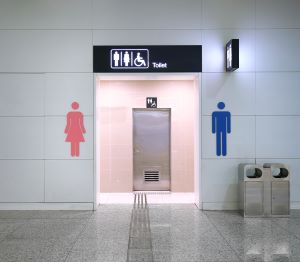A female council employee who was expected to use substandard toilet facilities that exposed her to the risk of seeing males using urinals was upheld by the Employment Appeal Tribunal as being a victim of direct sex discrimination. The Earl Shilton Town Council in Leicestershire lost its appeal to the Employment Appeal Tribunal and the council were ordered to pay damages for direct sex discrimination.
It was ruled that the toilets were inadequate for female staff due to the risk of seeing men using the urinal and the failure to provide a sanitary bin. As a result of these inadequate provisions, the female staff member who filed the complaint suffered less favourable treatment.
The facts of the case are that the employee was employed as an office clerk and worked in an office owned by the local Methodist Church. This building also served as a children’s playgroup. The employee was based in the part of the building that contained the male toilets and the women’s toilets. The women’s restrooms were also used by children who came to the play group. Female staff who needed to use the female toilets had to check with the playgroup staff that there was not a child in the toilet. Getting the attention of the playgroup staff was not always easy to do, and therefore the setup was flawed if a female staff member needed to urgently access the toilet.
In May 2017, the Council directed that female employees could use the men’s toilet. The male toilet set-up was a single urinal and a trough cubicle. A sign was made to warn women who were using the restroom but did not always stay seated. There was no lock on the main door to access the male toilets, and to access the cubicle, female staff had to walk past the urinal trough. There was an obvious risk that males could use the urinal regardless of the alert sign, and this exposed the females to a real risk of seeing a male using the urinal trough.
The employee complained that she had to use the male restrooms frequently. In January 2018, she complained about the lack of a sanitary bin, and in June, the church provided a bin and installed a lock on the primary door of the male toilets. The employee has complained the bin has not been emptied frequently and that a male caretaker is required to clean the toilet and empty the bin.
The Tribunal determined that the employee was harmed because of the arrangement. Not having access to the toilet services and the risk of seeing a male using the urinal, not disposing of the sanitary products—all these flaws amounted to detriments. Also, having to tell a male caretaker to empty the bins is disrespectful and an invasion of privacy. The employment tribunal noted there was no reason the arrangements could not have been made at a much earlier date.
The council appealed the decision. They claimed the toilet arrangements were the result of child safety requirements and could not be considered sex discrimination. They also claimed that the Tribunal ignored the risk that a man seeing a female using the urinal was equivalent to a woman seeing a man.
The Employment Appeal Tribunal dismissed both arguments, applying a common-sense approach to determine sex discrimination. Due to the risk of a male using the urinal and the lack of a sanitary bin, the female employee was denied adequate toilet access. A solution to the problems was not difficult, and the employer had acted very slowly to find a solution by placing a lock on the primary door of the toilet.
Employers have a duty to carefully assess toilet facilities to ensure all employees, regardless of gender, age, disability, race, or ethnicity, have equal access to toilet facilities. Employers ensure toilets have sanitary bins and are maintained regularly.
This article is for guidance only, and should you have a legal inquiry, please contact the Quest advice line 0116 274 9193.




